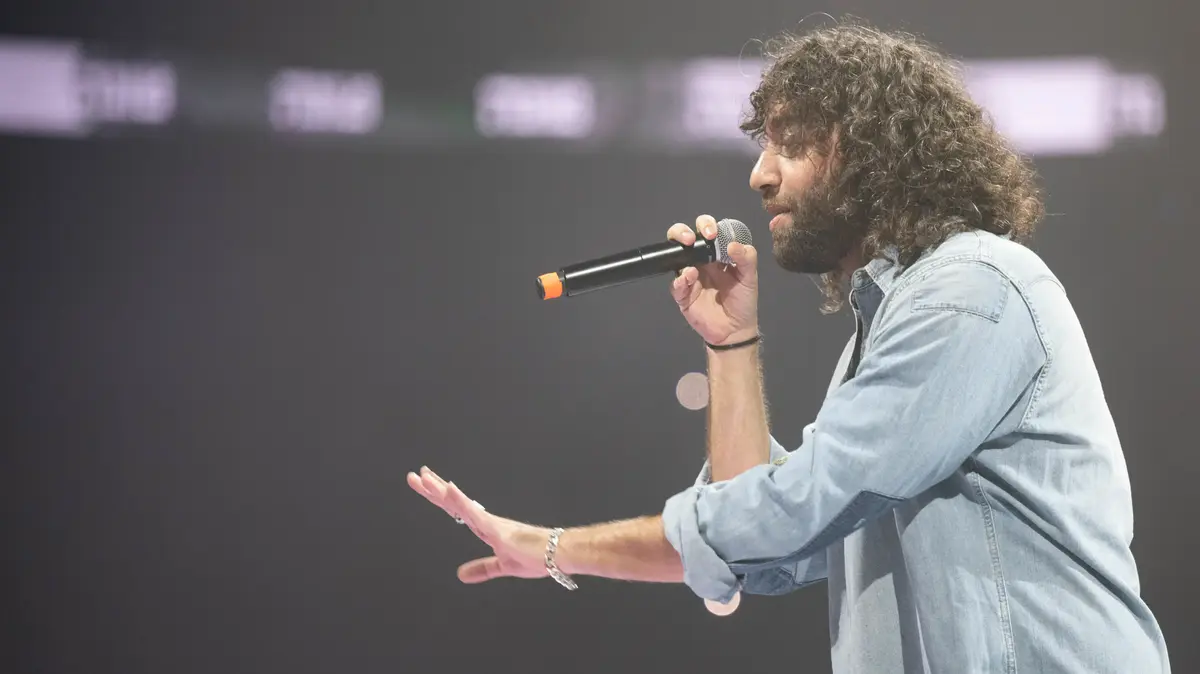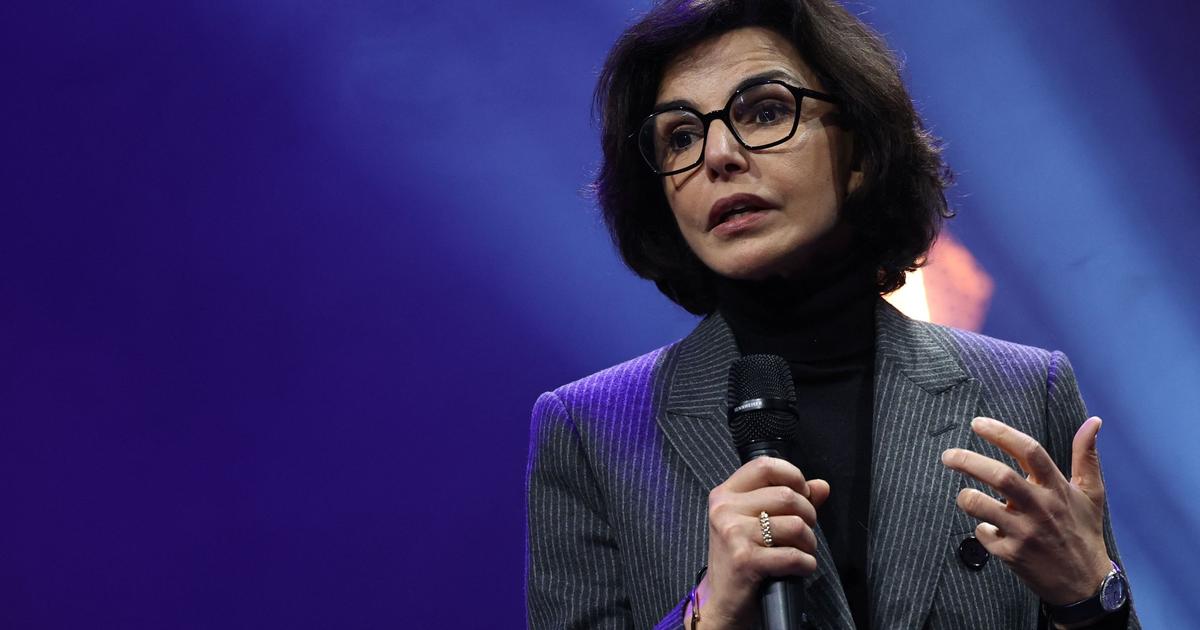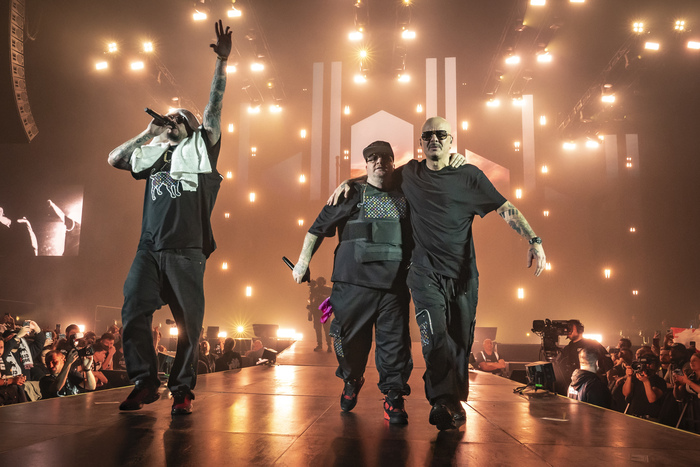Israeli hip-hop celebrated with a magnificent victory party.
When the power was already gone, the climax finally arrived
The "Kel Hakopa" show, which united a significant part of the stars of the current wave of the scene, presented for more than four hours excellent talents and stars in the making in front of a loyal and happy audience, but provided very few truly interesting moments or memorable performances.
Tonight's closing episode came too late, but saved the day
Nadav Menuhin
08/28/2022
Sunday, August 28, 2022, 10:40 am Updated: 10:55 am
Share on Facebook
Share on WhatsApp
Share on Twitter
Share by email
Share in general
Comments
Comments
Sima Nun (Photo: Shlomi Pinto)
2003 was not that long ago, but the Israel of that time looks completely different from the distance of time.
Eric Sharon and Moshe Katsav were the heads of the state, which sank into the gloom of the end of the second intifada;
The Israeli Internet was still in its infancy;
The first seasons of "Love Around the Corner" and "Great Country" were broadcast on television;
The parades featured the first songs of a new and surprising group called Idan Raichel's project, as well as Mashina's unification hit, and one show at Nitzanim Atid would shake up Israeli music for decades to come.
It wasn't that long ago, and yet, a completely different world.
In July of the same year, an unusual festival was held in the Tel Aviv port, under the name "All the Cash - Ten Years of Groove", which entered the mythology of Israeli music when a series of artists gathered on stage who were later described as the pioneers of hip-hop and black music in Israel.
The members of Shabak S reunited then for the first time, with the ex-members of the band Muki and the Space Pioneers also appearing separately; Hadeg Nahsh, who in the same year managed to break into the mainstream with their second album, which included the huge hits "Gabi and Debbie", "Lazove" and "Numsarim"; Subliminal and the Shadow, getting married On the success of "The Light of Zion" and "The Light and the Shadow"; Sultani the Shantifi, "Shuti HaNova"; coming out in Yoaka and presenting "Black Business", Kwami; and also: the veterans of the scene Nigel the Rebbe and the great fishy, Tomer Yosef who was still well known Mainly as a comedian, the super producer Yossi Payne, the promise Shahar Suisa, and MC Shiri, almost the only rapper active in the scene at the time.
In short: a dream team.
Tuna (Photo: Shlomi Pinto)
Thanks to those musicians, each in his own style, hip-hop gradually turned from a neglected and marginal genre, into an active community with its own rules and fans all over the country.
But never resilient: after a few happy summers and a flood of materials, that bubble quickly burst, and almost disappeared.
But quietly the buds waited their turn.
The fans of these artists prepared, wrote another verse and another, recorded a sketch and another sketch, and waited for someone to notice.
In the end it happened: Nechi Nech, Tuna and others broke through in the middle of the previous decade, opening the door.
After them came many others, older than them and younger than them, who finally got a chance.
You won't believe what happened next.
Today, Israeli hip-hop is no longer a rumor.
He is a powerhouse that promotes new talent at a dizzying pace, and creates meaning at a time when other genres have already given up or lost their power.
Now, 19 years after that evening, the reunion of the current generation has arrived.
Under the same title - "All the Cash", and on the initiative of one who was there last time, Filoni - a very impressive collection of artists, most of whom were small children at the time of that performance - gathered last night in Tel Aviv for a show of their own power.
The truth must be told: this generation has nothing to be ashamed of compared to that list of pioneers.
It's a more stable, stronger, talented, original and diverse scene than ever before.
Not that there is no room for improvement, but there is also something to celebrate.
The Yad Eliyahu Sports Hall may not be the first place that comes to mind for a hip-hop performance, but it is probably a place that is quite suitable for celebrating a victory.
Nega Erez (Photo: Shlomi Pinto)
Plus or minus 25 different rappers appeared one after the other on the 360 stage, in an evening that spread over more than four hours (more on that later).
We will not list each one, and anyway the power is in the quantity and the intense sequence.
Yes, it is worth saying that there is almost no sector that will not be represented on stage: Mizrahim and Ashkenazim, expatriates of the Soviet Union and Ethiopia and Arabs.
Everyone got a round of applause.
The first part of the show consisted mainly of names on the way to breaking through, at the beginning of the journey, and was perhaps the most exciting part at all.
Young singers, very hungry, not yet known but definitely know how to perform - got an unimaginable opportunity to perform in front of thousands of people in the hall with two songs each, and took it with both hands.
This is not obvious: the list of performers could have been cut by ten names or more and the line-up would still have remained impressive, and the more senior ones would have received more songs.
But there is an act of solidarity here, which can only exist within a community that is already strong and cohesive - to share a huge stage with young talents.
And make no mistake - no matter who was on stage, it was always possible to spot those in the audience who knew all the words.
Among the names we mention the exciting Tapash, the energetic culture shocker, and Abraham Legsa who simply danced on stage.
Next in line - the veteran Ortega and Sima Nunn who went on stage four times throughout the evening, more than anyone else - raised the level even further before the first intermission.
More in Walla!
In one performance, Assaf Amdorski packed all the advantages that made him a beloved artist
To the full article
Alfie and Tuna puppies (Photo: Shlomi Pinto)
The transition sections had the favorite Amon Guri Alfie, but they didn't excel too much.
Alfie opened by saying that it was a hot dog party in the back, and that there were no women for the show.
This is an annoying statement precisely because it is true: four female singers out of 25 performers is an embarrassing figure, and the organizers of the evening should have recruited more female rappers.
It's not that there isn't one (where is the excellent Orit Tashuma?).
This was not the only disappointing thing about the group of performers, which was ultimately quite conservative: no off-stage entertainment, no names from the previous generation (almost, with the exception of Uri Shochat), no reunions of the groups that broke up and with too little significant mixing between the artists.
Too bad.
After the break, two groups came up - that of the "Shigula" label, which included, among others, the impressive Eden Derso and Cohen, who provided the first hits of the evening;
And "Shochtoda" headed by DJ Uri Shohat, who hosted Teddy Ngosa - who released the best Israeli hip hop album of the year - Lukach, Sima Nun, Peled, Waybeish and also Ravid Plotnik in his first performance on stage.
Teddy also got the stage alone for a joint performance with Avraham Legsa for "too nice with them".
After another break, a few more relatively familiar names came up - Atar Meiner, Shekel, Tzukosh, and Echo, who happily performed materials in Hebrew, including the theme song of the "Commander" soundtrack.
Throughout this part, the audience is in a frenzy.
Peled (Photo: Shlomi Pinto)
Shekel performed his song "Only Miriam", which shocked the spirit of the entire show.
We already said that these are victory celebrations, but when each artist struggles to give everything in his little time, the result is very intense, mainly includes very rhythmic songs in a party that never ends.
It was a lot of fun - and the audience definitely enjoyed it - but also unbalanced, not that exciting and not that interesting.
Almost without saying, almost without getting out of me and me and me and me, and also almost without any memorable performance.
Fun and nothing more.
Some of the answers came in the last part of the evening - with the five most prominent names: Jimbo J, Peled, Nega Erez, Tuna and Ravid Plotnik.
It was already a little too late, in an evening that lasted over four hours and ended just a little after one in the morning.
Although the hall remained relatively full until the end, there were also those who had to leave without receiving the main course (as of 11:30 p.m., cedar, tuna and plotnik had not yet arrived).
Here everyone has already received their own respectable set.
Jimbo J probably gave the best performance of the evening, with a strong sequence of hits, when "Stalbat in Kibbutz" or "Mami on this" are received with a lot of love (an interesting experience to hear a whole hall shouting "I went to hunt the Nazis").
After him, Peled came up with flags to the screams of the audience who sang every word with him;
Nega Erez was responsible for another strong moment, when she brought up Eden Derso and Sima Nun for a joint and interesting performance of "Nails";
Tuna, who already feels natural in front of large audiences, caused the entire hall to shout "Hon, Shelton, Underworld", in a rare moment in a show of counterculture;
And finally Ravid Plotnik, the cream king of the Middle East, who hosted ZK and Tamir Bar for a joyful performance of "The Little Citizen I" from "Shem Tov Abi", and ended with Jimbo J in a joint performance of "Samurai", without amplification.
This is perhaps the only moment that can be described as creepy, and it really was.
At this point it was already one in the morning, as mentioned after more than four hours of a show, more than an hour over the planned time period.
Plotnik and Jimbo saluted the crowd, and for some reason went down without saying a word.
It was a truncated, puzzling end to an evening in which words were sung non-stop.
Suddenly silence.
Suddenly, all that was left was only a shadow on the stage.
culture
music
Israeli music
Tags
tuna
Ravid Plotnik









